I used to load my tools into the wrong trailer every morning. It slowed me down. Things fell. Weather ruined gear. It was frustrating.
Once I switched trailers, everything changed.
I’ve been hauling loads for years now—tools, machines, and gear for different jobs. I’ve learned the hard way what works.
That’s why I wrote this. If you’re deciding between a utility and cargo trailer, I’ll help you make the right call.
You’ll learn the real pros and cons, how they fit different jobs, and how to pick what works best for your work.
By the end, you’ll have a clear answer: utility trailer or cargo trailer—what’s right for you?
So let’s start!
1. What is Utility Trailer?
A utility trailer is a basic, open trailer with no walls or roof. You’ve probably seen one behind a pickup, hauling yard waste or landscaping tools.
It’s built with an open deck, a simple frame, and a light structure. No roof means you can load from almost any angle. That’s one thing I like about it: easy access and quick loading.
Most utility trailers include these common features:
- Mesh Floors: Helps keep the trailer light and lets dirt or water fall through
- Side Rails: Keeps your load from slipping off
- Ramps: Makes it easier to roll equipment on and off
They’re usually made of steel or aluminum. Light to pull. Strong enough to handle daily work.
I’ve used utility trailers for all sorts of things:
- Lawn mowers
- Farm gear
- Scrap metal
- Piles of mulch
They’re perfect when you need space and speed.
At Rhinotrail, we offer utility trailers that are made from premium steel and anti-corrosion coatings withstand harsh environments and heavy loads.
Next, we’ll talk about cargo trailers and how they compare.
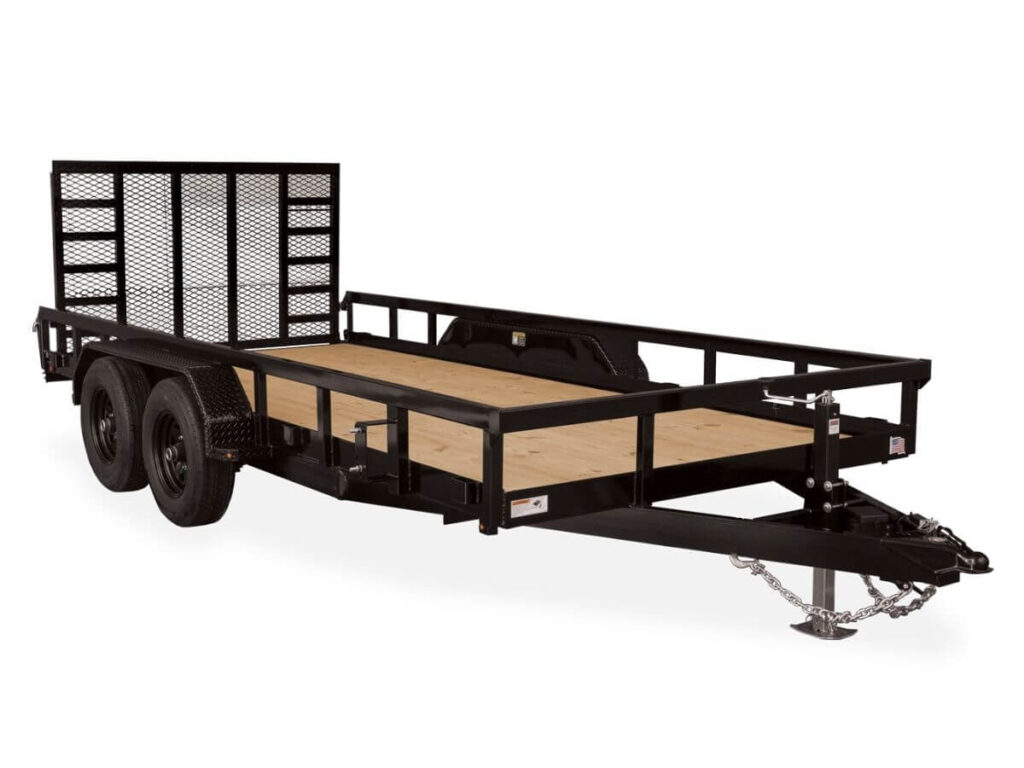
2. What is Cargo Trailer?
A cargo trailer is a fully enclosed trailer with walls, a roof, and a locking door. Think of it like a moving box on wheels. It keeps your tools, gear, or supplies protected.
The structure is solid. It’s built with a box-style frame. The walls are made of metal or durable panels. Everything stays inside, safe from weather or theft.
Most cargo trailers come in two main types:
- Single Axle: Better for light loads and easier to tow
- Tandem Axle: Handles heavier weight and offers more stability on the road
I remember hauling expensive gear across two states. I didn’t worry once about rain or prying eyes. That peace of mind? That’s what a cargo trailer gives you.
Cargo trailers are perfect if you carry things that can’t get wet or damaged. I’ve used them for:
- Power tools
- Job site materials
- Event gear
- Even furniture during a move
Lock it up, and you’re good to go. No tarps. No last-minute packing tricks.
Let’s break it down further in the next section. We’ll compare both trailers side by side.
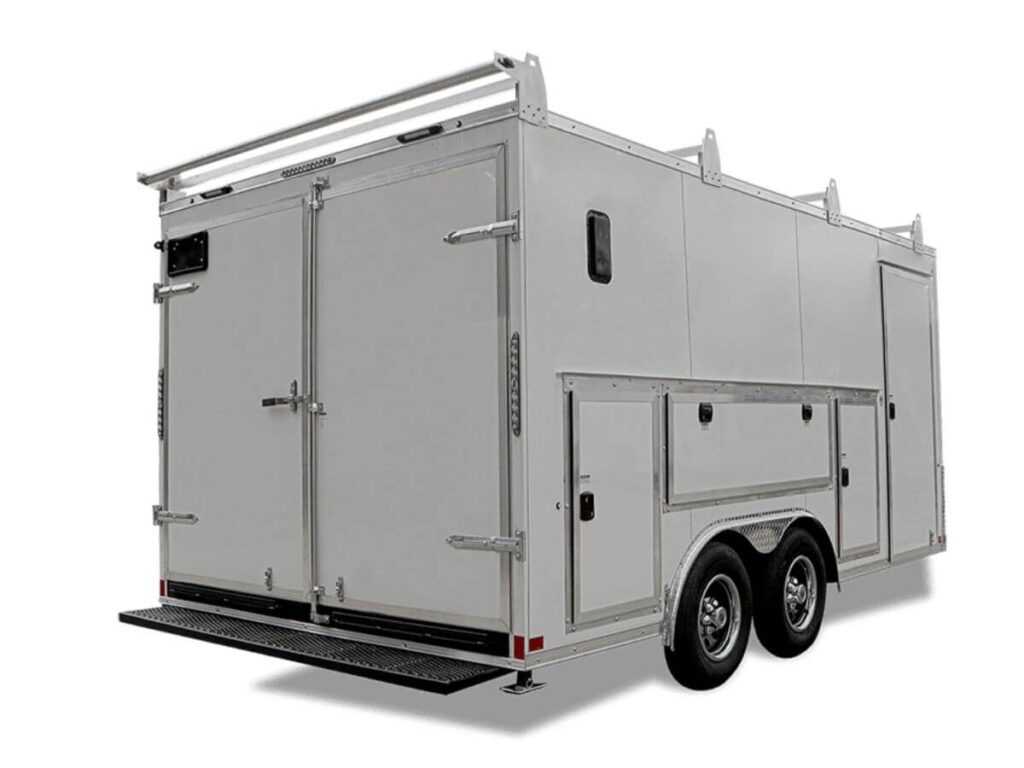
3. Weight and Load Capacity
The first time I hauled a full load of bricks on a utility trailer, I didn’t think much about weight. I just loaded up and hit the road. Big mistake. The trailer swayed, my truck struggled, and I white-knuckled the whole drive.
Weight and load capacity aren’t just numbers. They affect how your trailer handles, how safe your trip is, and how much your vehicle can pull.
Utility Trailers: Lightweight and Easy to Tow
Utility trailers are known for being lightweight. Their open design makes them easier for smaller vehicles to pull.
But with that light weight comes a trade-off: no weather protection. You’re open to rain, sun, and flying debris.
Cargo Trailers: Heavier but Higher Capacity
Cargo trailers have solid walls and roofs. That makes them heavier than utility trailers.
They also have a higher Gross Vehicle Weight Rating (GVWR). GVWR is the total weight a trailer can safely handle—including the trailer and its cargo.
Trailer Size and Axle Setup
How much a trailer can carry depends on these two things:
- Size: Larger trailers can handle more weight
- Axle Configuration:
- Single Axle: Easier to tow, less capacity
- Tandem Axle: Supports more weight, more stable
Don’t overload your vehicle. Always check its towing specs before you hitch up.
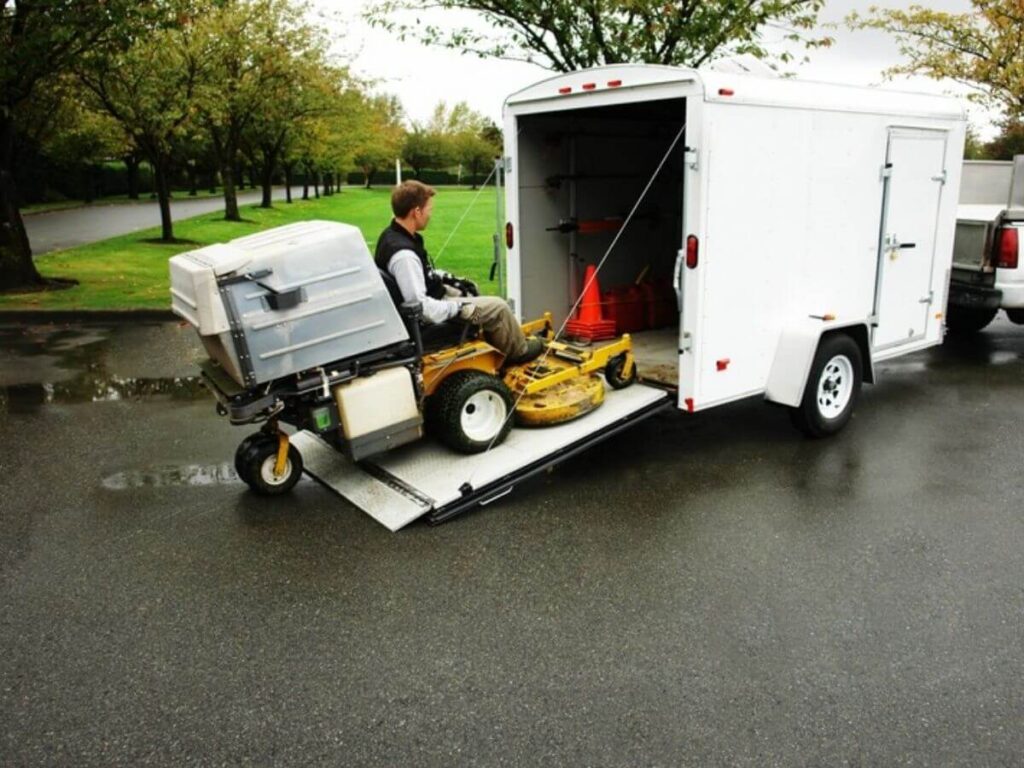
4. Operational Flexibility
The type of trailer you choose should match how you work. Some jobs need quick loading and unloading. Others need full protection for tools, supplies, or equipment. That’s where operational flexibility comes in.
Utility Trailers: Open, Fast, and Versatile
Utility trailers are open-deck trailers. This makes them easy to use, especially when time matters.
- Easier Loading and Unloading: No walls or roof means you can access cargo from any side. No doors to open. Just load and go.
- Works Across Job Types: Useful for landscaping, farming, light construction, or hauling trash and scrap
They’re a solid choice for jobs that change often. Whether moving a lawnmower in the morning or picking up lumber in the afternoon, a utility trailer can handle both.
There’s also less hassle. Fewer parts to manage. No interior to organize. Just a simple frame and deck that gets the job done.
Cargo Trailers: Secure, Covered, and Multi-Use
Cargo trailers give more control over what happens to your load.
- Enclosed Body: Keeps tools safe from rain, wind, and dust
- Lockable Doors: Helps protect against theft or tampering
- Multi-Purpose Use: Often used as mobile storage or even temporary workstations on job sites
For people transporting valuable or weather-sensitive equipment, cargo trailers offer peace of mind. No need to unload everything at the end of the day. Just lock it and leave it until tomorrow.
Some crews even set up shelves or hooks inside for better organization. That turns the trailer into more than just a hauler—it becomes part of the workspace.
5. Cost Comparison
Let’s face it—price matters. But the cheapest option isn’t always the best one over time. It depends on how you plan to use the trailer and what you’re hauling.
Initial Purchase Cost
Utility trailers are usually more affordable when buying new.
They’re built with a basic frame, open deck, and fewer materials. No roof. No walls. Fewer parts to repair or replace. That keeps the price low and simple.
For someone just starting out or only using it part-time, this makes a lot of sense. I remember picking up my first utility trailer from a local dealer. It was light, easy to tow, and didn’t break the bank. It got me through my first few years just fine.
Long-Term Value
Cargo trailers cost more upfront, but offer more in return.
You get full coverage: protection from rain, dust, and sun. Lockable doors add peace of mind when gear is left overnight. That means fewer worries, fewer losses, and less damage over time.
If you haul expensive tools or sensitive materials, that protection starts to pay for itself. I’ve had both. And while the cargo trailer cost more, I didn’t have to replace a single tool due to weather damage.
Resale Value and Depreciation
All trailers lose value over time. That’s normal. But cargo trailers—if, if kept in good shape—tend to hold their value longer.
Buyers often look for trailers that are clean, dry, and secure. A utility trailer with rusted rails or bent mesh? That’s harder to sell. But a cargo trailer with working locks and a solid roof still catches interest years later.

6. Maintenance and Longevity
Maintenance isn’t something most people think about when buying a trailer—but it should be. I learned this after a side rail on my utility trailer gave out mid-haul. If I had caught the rust earlier, it wouldn’t have happened.
Since then, I’ve made trailer checks part of my routine. It doesn’t take long. A few minutes here and there can save you big down the road.
Both utility and cargo trailers need care, but the work is different depending on the type.
Utility Trailers: Exposed but Easy to Inspect
Utility trailers are out in the open. That’s part of their strength—but also a weakness. Rain, sun, and dirt hit every surface.
Here’s what to keep an eye on:
- Deck Surface: Wood can wear, crack, or rot without treatment
- Welds and Frame Joints: Rust tends to form at the edges and corners
- Paint or Finish: Recoating might be needed over time to protect the steel
One good thing: you can usually see problems right away. No walls means nothing hides.
Cargo Trailers: Protected but More Moving Parts
Cargo trailers hold up better against the elements, but they come with doors, seals, and more hardware to manage.
Key areas to check include:
- Door Hinges and Latches: These need cleaning and oiling or they’ll stick
- Roof and Seals: Leaks can happen, especially if the trailer sits outside for long periods
- Interior Panels: Watch for moisture, especially near the floor
Even though it’s enclosed, don’t assume everything inside is fine. Water can still sneak in.
What Both Trailers Need
No matter which one you use, some maintenance is the same:
- Tires: Check for wear, cracks, and proper pressure
- Brakes: If your trailer has them, test regularly
- Axles and Bearings: Grease on schedule to keep them rolling smooth
A little care keeps your trailer running longer and safer. Whether it’s once a week or before a long trip, a quick look can prevent expensive problems.
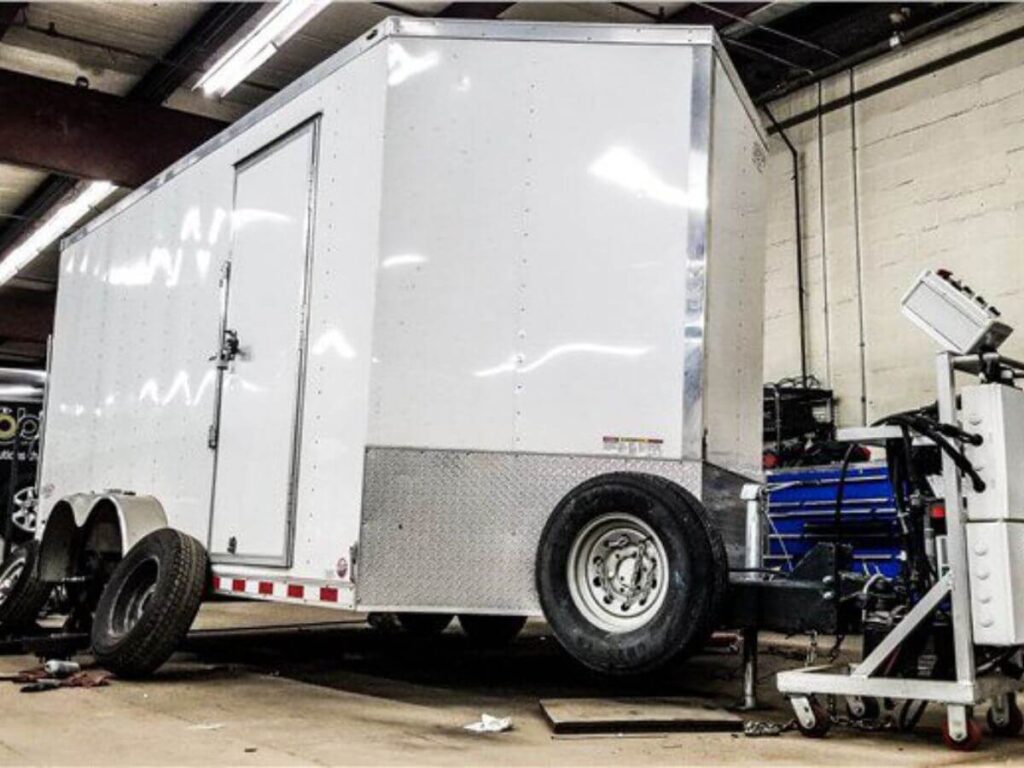
7. Industry-Specific Use Cases
Not every job needs the same trailer. The kind of work you do plays a big role in what trailer makes the most sense. What works on a farm might not work on a jobsite. Below are some real-world examples based on different industries.
Construction
Construction work is rough, fast-paced, and changes daily. Both trailer types show up on job sites, but for different reasons.
- Utility Trailer: Great for moving lumber, pipes, tools, and loose materials
- Cargo Trailer: Used as a secure space for storing high-value tools and equipment
On many job sites, crews use the cargo trailer like a rolling tool shed. It keeps everything dry and locked up after hours. So if you’re in this industry and looking for either of these two trailers, choose Rhinotrail. We guarantee that every unit undergoes stringent testing for long-lasting safety and performance.
Agriculture
Farm work demands flexibility. You never know what you’ll be hauling next—tools, fencing, feed, or crates.
- Utility Trailer: Ideal for carrying hay, fencing supplies, and farm tools
- Cargo Trailer: Works well as mobile storage or even a roadside produce stand
Some growers use enclosed trailers for direct-to-customer sales. It keeps things clean and covered.
Logistics and Transportation
The type of haul matters here. Short trips vs. long-distance? That changes the trailer you’ll want.
- Utility Trailer: Best for short regional deliveries where quick loading helps
- Cargo Trailer: Better for long-haul trips, especially when goods need protection
Enclosed trailers are common in e-commerce and delivery services. They keep packages safe and organized across miles.
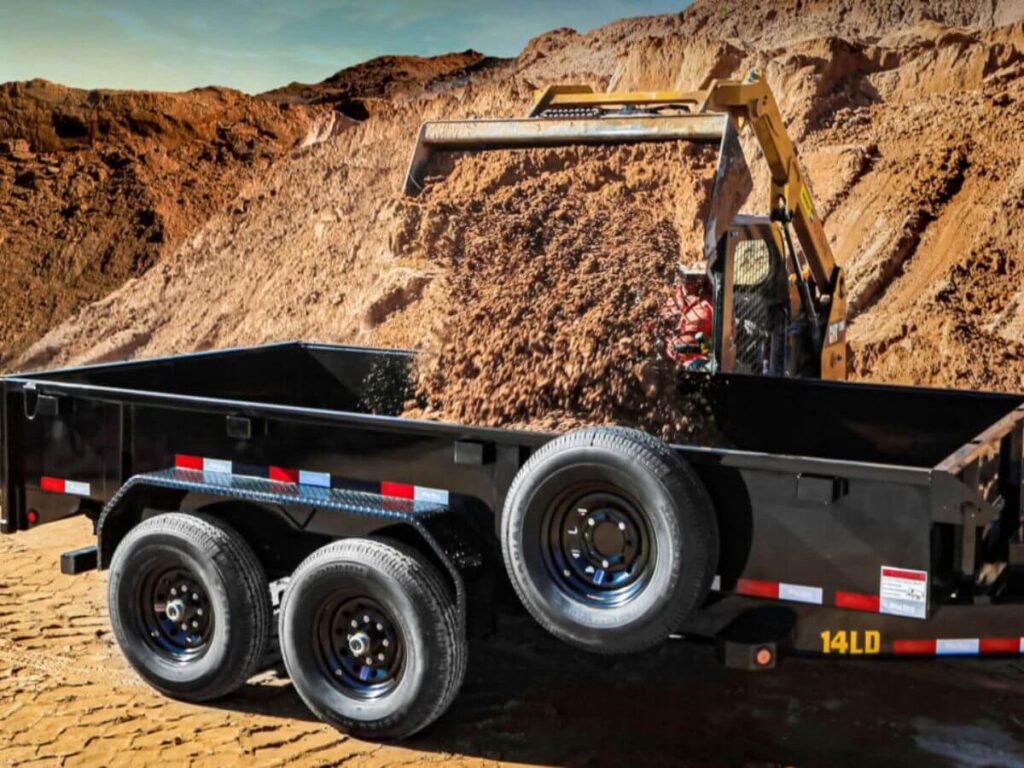
8. Tips For Choosing The Right Trailer For Your Needs
Choosing the right trailer isn’t just about the price tag—it’s about how it fits into your daily work. A trailer should make the job easier, not harder. These simple tips can help you make the right choice.
Tip #1 Know What You’re Hauling
Think about the items you move most often. If you’re hauling yard tools, farm supplies, or bulk materials, a utility trailer may be the better choice. But if your work involves fragile or expensive gear that can’t get wet or damaged, a cargo trailer is a smarter option.
Tip #2 Consider Your Work Environment
Where you work matters. Utility trailers are better for farms, open land, and short trips where speed and access count. Cargo trailers work better on construction sites or in cities, where security and weather protection are more important.
Tip #3 Check Your Vehicle’s Towing Capacity
Always know how much your truck or SUV can tow. A small utility trailer might be fine for most vehicles, but a larger tandem-axle cargo trailer can get heavy fast. Overloading risks damage and safety.
Tip #4 Think About Flexibility
Some trailers are more versatile than others. Utility trailers are open and can carry all sorts of odd-sized items. Cargo trailers aren’t as flexible with space, but they double as mobile storage or even a temporary work area.
Conclusion
I used to waste time every morning with the wrong trailer. Tools shifted. Weather ruined gear. It slowed me down. Once I switched, everything got easier.
Now you’ve got the full picture—utility vs. cargo, side by side. We covered weight, cost, maintenance, and more.
Start now. Pick the trailer that fits your work—not just your budget.
Ready to upgrade your hauling game?
Contact us today to find a trailer built for your job, your gear, and your goals.


